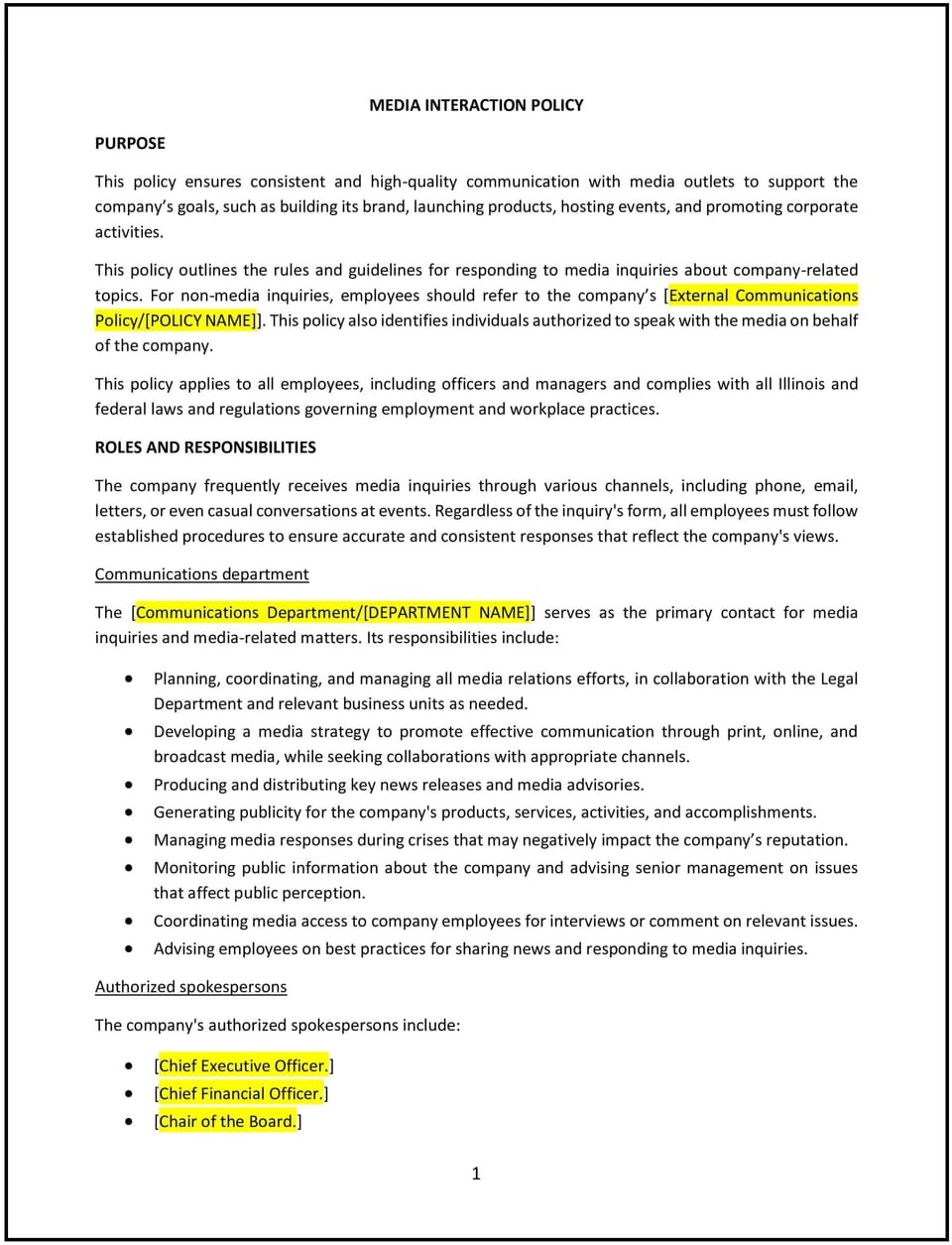Media relations policy (Illinois): Free template

Media relations policy (Illinois)
This media relations policy is designed to help Illinois businesses manage their interactions with the media. It outlines procedures for handling media inquiries, issuing press releases, and ensuring that communications align with the company’s values and Illinois legal requirements.
By adopting this policy, businesses can maintain consistency, protect their reputation, and foster positive relationships with the media.
How to use this media relations policy (Illinois)
- Define spokespersons: Specify which employees are authorized to speak on behalf of the company, such as executives or designated media relations personnel.
- Outline approval processes: Require prior approval for press releases, interviews, or other media communications to ensure consistency and accuracy.
- Provide media inquiry procedures: Instruct employees to redirect media inquiries to the authorized spokesperson or media relations team.
- Address confidentiality: Prohibit sharing confidential or proprietary information with the media without proper authorization.
- Include crisis communication protocols: Establish procedures for handling media communications during crises, including designating a crisis communication team.
- Promote consistent messaging: Ensure that all media communications adhere to the company’s branding, tone, and messaging guidelines.
- Offer training: Provide training for authorized spokespersons to improve media interaction skills and maintain professionalism.
- Monitor compliance: Regularly review media communication practices to align with Illinois laws and company policies.
Benefits of using this media relations policy (Illinois)
This policy provides several benefits for Illinois businesses:
- Protects reputation: Ensures consistent and professional communication with the media.
- Enhances compliance: Aligns with Illinois legal requirements for business communications.
- Promotes accountability: Establishes clear roles and responsibilities for media interactions.
- Improves messaging: Maintains a unified voice that reflects the company’s values and objectives.
- Reduces risks: Minimizes the potential for misinformation or unauthorized disclosures.
Tips for using this media relations policy (Illinois)
- Communicate the policy: Share the policy with employees and include it in the employee handbook to ensure understanding.
- Train authorized spokespersons: Provide regular training on media interaction, crisis communication, and company messaging.
- Use centralized approval: Ensure all media communications are reviewed and approved by the media relations team or authorized personnel.
- Monitor media coverage: Regularly track media mentions to assess the effectiveness of the company’s media strategies.
- Update regularly: Revise the policy to reflect changes in Illinois laws, company practices, or media trends.
Q: Who is authorized to speak with the media?
A: Only designated spokespersons, such as executives or media relations personnel, are authorized to speak on behalf of the company.
Q: How should employees handle media inquiries?
A: Employees should redirect all media inquiries to the authorized spokesperson or media relations team, as outlined in this policy.
Q: What information can be shared with the media?
A: Only approved information, such as press releases or statements authorized by the company, can be shared with the media.
Q: Are employees allowed to share company information on social media?
A: Employees may share information only if it aligns with the company’s social media guidelines and does not include confidential or proprietary details.
Q: How does the company handle media during a crisis?
A: The company follows established crisis communication protocols, including designating a crisis communication team and issuing approved statements.
Q: How often is this policy reviewed?
A: This policy is reviewed annually or whenever significant changes occur in Illinois laws, company practices, or media strategies.
Q: Can employees be trained to become spokespersons?
A: Yes, employees may be selected and trained to become authorized spokespersons based on their roles and skills.
Q: Does this policy apply to third-party PR firms?
A: Yes, third-party PR firms working with the company must adhere to the guidelines outlined in this policy.
This article contains general legal information and does not contain legal advice. Cobrief is not a law firm or a substitute for an attorney or law firm. The law is complex and changes often. For legal advice, please ask a lawyer.


